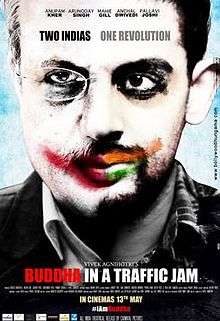Buddha in a Traffic Jam
| Buddha in a Traffic Jam | |
|---|---|
 Official release poster of Buddha in a Traffic Jam | |
| Directed by | Vivek Agnihotri |
| Produced by |
|
| Written by | Vivek Agnihotri |
| Starring |
|
| Music by | Rohit Sharma |
| Cinematography | Attar Singh Saini |
| Edited by | Sattyajit Gazmer |
Production companies |
|
| Distributed by | Carnival Motion Pictures |
Release date |
|
| Country | India |
| Language |
|
Buddha in a Traffic Jam is a 2016 Indian socio-political drama film written and directed by Vivek Agnihotri.[1] Its ensemble cast include Arunoday Singh, Anupam Kher, Pallavi Joshi, Mahie Gill, Anchal Dwivedi, Indal Singh and Gopal K Singh. The film narrates the story of a professor who advocates his business students about the need of a revolution in India and the world at large, also sampling themes like corruption, campus politics, moral policing, and crony capitalism.
The film premiered at IIT Bombay on 6 April 2016. It was released nationwide on 13 May 2016.[2]
Plot
Vikram Pandit (Arunoday Singh) is a happy-go-lucky management student from a business school in India. He becomes an overnight sensation after a successful social media campaign against the radical fundamentalism of moral policing in India. Little did Vikram know that he was about to become a part of a plot that would risk his life and the nation. He gets entangled between two facets of India – Socialism and Capitalism, both of which are deeply rooted in isolated corners of the country.
Somewhere deep within the jungles, flagrant conspirators were gearing up to maim the Country. They had established links with the patrician society. Vikram's internet campaign pulls him into a very deep web of conspiracy.
The film revolves around Vikram's survival in the sinister designs of establishment. It resolves the age long conflict between Capitalism and Socialism and defines the much-needed revolution for the contemporary India.
Cast
- Arunoday Singh as Vikram Pandit[3]
- Mahi Gill as Charu Siddhu
- Anupam Kher as Professor Ranjan Batki
- Pallavi Joshi as Sheetal Batki
- Vivek Vaswani
- Anchal Dwivedi
- Gopal K Singh as Naxal chief
- Indal Singh as Nanhe Singh-political leader
Development
The film uses a real life incident of moral policing in Mangalore where young girls were beaten up in a pub for "western cultural activities." The group later protested against the police under an impromptu 'Pink Chaddi' campaign. In the film it's called Pink Bra Campaign, which highlights the atrocity of moral policing in India.
Release
The film was released on 13 May 2016.[4]
Controversies
In May 2016, the film was scheduled to be screened for students at Jawaharlal Nehru University. It was denied by the university's administration due to the unstable political atmosphere within the campus. However, the film was invited by the students and was subsequently screened in open air with over 40 students, faculty and political leaders.
References
- ↑ "Convincing producers for non-star film difficult: Vivek Agnihotri". 7 April 2016.
- ↑ "'Buddha in a Traffic Jam' premiered at IIT Bombay - Times of India".
- ↑ Hungama, Bollywood. "Buddha In A Traffic Jam 2016 Movie News, Wallpapers, Songs & Videos - Bollywood Hungama".
- ↑ "'Buddha in a Traffic Jam' passed by censors without any cuts: Director Vivek Agnihotri". The Indian Express. 13 April 2016. Retrieved 9 May 2016.